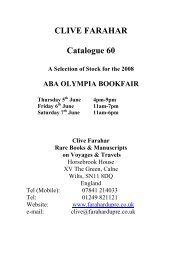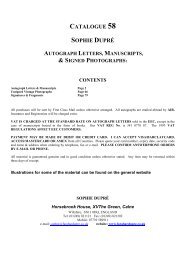You also want an ePaper? Increase the reach of your titles
YUMPU automatically turns print PDFs into web optimized ePapers that Google loves.
Clive Farahar & <strong>Sophie</strong> Dupré, XV The Green, Calne, Wilts, SN1 8DQ, Tel: (01249) 821121 48<br />
3<strong>56</strong>. PRINGLE (Mary, b. 4th February 1801, later<br />
Beague, eldest daughter of Maj.-Gen. James Pringle, 1746<br />
or 1747-1810, Bengal Army)<br />
3 entertaining volumes of her Travel Journal on the<br />
Continent, in post-1815 Europe, from Le Havre to Paris,<br />
Switzerland and Italy, returning by Germany, the Rhine,<br />
Brussels and Rotterdam, <strong>56</strong> + 22 + 31 pp. text plus a few<br />
blanks, 8vo., stitched, marbled covers to 1st volume, 31st<br />
July 1819 - 28th August 1820, and 1st August 1821 - 8th<br />
October 1821 [SD50016]£375<br />
Mary travelled with her mother Charlotte (née Halkett, 1773 or<br />
1774-1853), her stepfather Stewart Boone Inglis (m. 1818), and<br />
sister Charlotte (b. 16th August 1806). Besides art and<br />
architecture she takes great interest in manufacturing processes,<br />
such as the silvering of plate glass at Paris, the Gobelins, and the<br />
great water tower shaped like an elephant and castle in the Place<br />
de la Bastille. She visits the Deaf and Dumb school in Paris,<br />
Pestalozzi in Switzerland, the agricultural school near Berne, and<br />
the military school in Milan, describing their methods (Pestalozzi<br />
gives the pupils examples, they deduce the rules for themselves).<br />
She admires the roads built by Napoleon, especially the Simplon,<br />
sees the statue of ‘Jupiter’ in Milan done with the head of<br />
Napoleon, and is even given at dinner there a lock of the<br />
Emperor’s hair. She admires too the grace with which ordinary<br />
French people dance for an evening’s relaxation at the Tivoli<br />
Gardens, gets invited to join a wedding party, and haggles with<br />
shopkeepers for the local price. When the party change horses,<br />
there is no stopping her and her mother clambering up for a fine<br />
view - her description of the successive heights at Milan <strong>Cat</strong>hedral<br />
is particularly evocative.<br />
The party spend a month at Paris, where ‘restaurants’ are still<br />
comparatively new. They then hire a boy and four mules to go in<br />
eight days toGeneva. The famous sudden view of Mont Blanc, at<br />
sunset and cloudless, is “like magic”. They find themselves in the<br />
footsteps of Rousseau, Voltaire and Byron, whose name they see<br />
carved at Chillon. They stay long in Milan (October 1819 -<br />
August 1820), then take a house on Lake Como, visiting all the<br />
nobility’s gardens by boat. The story resumes in August 1821 in<br />
“Baden en Baden”. All roads, it seems, lead to the Frankfurt<br />
Autumn fair. The longest stop on the way home is at Brussels (10<br />
days), where they see the Duke of Wellington in the Park, along<br />
with Lord Castlereagh, ambassador Clancarty, and Lady Jersey.<br />
They find that the King of the Netherlands is expected, along with<br />
George IV, whom they have never seen in England, and who<br />
“astonished us by his immense size”.<br />
With many other vignette descriptions, of clothing, road travel,<br />
seeing Louis XVIII dine in public, and shrewd comments on<br />
actors and singers, fellow travellers and local notables.<br />
With sketches of the Great Tun at Heidelberg, and of the<br />
monument at Breda to Count Engelbrecht of Nassau.<br />
357. PRINGLE (Mary, b. 4th February 1801, later<br />
Beague, eldest daughter of Maj.-Gen. James Pringle, 1746<br />
or 1747-1810, Bengal Army)<br />
Sketch Book of 7 finished and 6 unfinished drawings, the<br />
finished include 2 of “Mr Egerton’s Cottage” with thatched<br />
roof and rustic portico, 2 of a 66-gun man-of-war, and<br />
studies of twigs (all pencil), with, in colour, 2 vignettes of<br />
country scenes, the figures in bright colours, the unfinished<br />
ones show farms, the coast, and looking out to sea, original<br />
marbled limp covers, 12 leaves 10½” x 8”, Teignmouth and<br />
n.p., n.d. and September 1823 - March 1824, old minor blot<br />
on front cover [SD50017]£350<br />
Slipped in are (native Indian) coloured drawings of an Indian<br />
gentleman writing at his table, a Grass Cutter and Smoking a<br />
Hookah, and two Indians bricklaying.<br />
358. PULSZKY (Therese, Wife of the Hungarian<br />
Politician and Author Ferencz Pulsky 1814-1897)<br />
ALS toMiss (Sabilla) Novello at Genoa, “You will have<br />
heard the joyful tidings about Garibaldi’s state of health”,<br />
alongside whom her husband had fought in 1862, with wry<br />
comments on doctor’s bills and “Dr. Partridge’s pleasure<br />
trips to Spezia which have been but too freely remunerated<br />
by the British public!!”, adding “Mr [J. Alfred] Novello”,<br />
1810-1896, “will have seen with pleasure Cobden’s speech<br />
at Rochdale [?November 1864]”, “none but Louis<br />
Napoleon can rejoice if the two great nations stand opposed<br />
to each other”, delivered by hand by her husband, 2 sides<br />
8vo., Turin, 3rd November n.y., c. 1864 [SD13115]£75<br />
359. PUSEY (Dr. Edward Bouverie, 1800-1882, Anglican<br />
High Church Leader)<br />
ALS to ‘My dear Wynter’, about a half-measure which<br />
“comes too late now ... I will not put my hand to any such<br />
measure, it goes on no principle, we have no objection to G.<br />
except that he is inferior to W[illiams]”, (Isaac Williams,<br />
1802-1865, who stood unsuccessfully for the Professorship<br />
of Poetry at Oxford), 1 side 8vo., 116 Marine Parade,<br />
“Oct[ave] of Xtmas, Thursday Ev.” (30th December) 1841,<br />
guard strip on blank verso [SD13118]£40<br />
Dr. Philip Wynter, 1793-1871, was President of St. John’s,<br />
Oxford from 1828 and Vice-Chancellor 1840-1844.<br />
ENNELL (Sir James Rennell Rodd, 1858-1941,<br />
Diplomat and Writer, from 1933 1st Baron)<br />
Fine ALS ‘RR’ to his mother, telling her that he<br />
has “got back safely yesterday after a pretty good tossing in<br />
the small P & O from Brindisi ... Little Wingate”, (General<br />
Sir F. Reginald WINGATE , 1861-1953), “has had a<br />
tremendous success. The news was too much for Lady<br />
Wingate who there and then presented her absent husband<br />
with a daughter ... He is very much pleased. I wished things<br />
looked as bright in the Transvaal. I suppose we cant hope<br />
always to be able to make war with a minimum of anxiety &<br />
the Khalifa died game. There was something very fine in<br />
the end of amanwhoIbelieve had been from our point of<br />
view a master of cruelty. He was sitting with all his emirs<br />
round them in the order of their rank riddled with bullets.<br />
Men with not an idea of surrender ... the game was up and<br />
had gone against him, so he waited on death with a stoicism<br />
which one must admit was magnificent ... One dreads to<br />
get the news of the next few days from Natal and from the<br />
other side too for the matter of that”, 4 sides 8vo., Cairo,<br />
7th December 1899 [SD13173]£150<br />
Abdullah et Taaisha, (1846-1899), was principal khalifa or<br />
vicegerent to the Mahdi, and empowered to act in his name. The<br />
Mahdi named him his successor on his deathbed in 1885 and for<br />
thirteen years Abdullah ruled over what had been the Egyptian<br />
Sudan. He moved his capital to Omdurman and there Kitchener in<br />
1898 almost annihilated his army. Abdullah fled to Kordofan<br />
with the remnant of his host, and finally gave battle to Wingate at<br />
Om Debreikat as described in the letter.<br />
The Boers had invaded Natal on the outbreak of war, 11th<br />
October 1899. By the time of this letter, Ladysmith (to where the<br />
British forces in Natal had fallen back), Mafeking and Kimberley<br />
were all under siege. Signs of hope did not appear till Field<br />
Marshal Lord Roberts was placed in supreme command, with<br />
Kitchener as his chief of staff, in January 1900.





